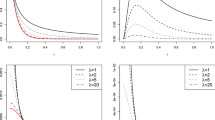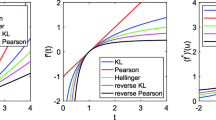Abstract
In this article we study the consistency of optimal and stationary (KKT) points of a stochastic non-linear optimization problem involving expectation functionals, when the underlying probability distribution associated with the random variable is weakly approximated by a sequence of random probability measures. The optimization model includes constraints with expectation functionals those are not captured in direct application of the previous results on optimality conditions exist in the literature. We first study the consistency of stationary points of a general NLP problem with convex and locally Lipschitz data and then apply those results to the stochastic NLP problem and stochastic minimax problem. Moreover, we derive an exponential bound for such approximations using a large deviation principle.
Similar content being viewed by others
References
Andrews, D.W.K.: Consistency in nonlinear econometric models: a generic uniform law of large numbers. Econometrica 55, 1465–1471 (1987)
Artstein, Z., Wets, R.J.-B.: Consistency of minimizers and the SLLN for stochastic programs. J. Convex Anal. 2, 1–17 (1995)
Attouch, H., Wets, R.J.-B.: Approximation and convergence in nonlinear optimization. In: Nonlinear Programming (Madison, Wis., 1980), vol. 4, pp. 367–394. Academic Press, New York (1981)
Aumann, R.J.: Integrals of set-valued functions. J. Math. Anal. Appl. 12, 1–12 (1965)
Bastin, F., Cirillo, C., Toint, P.: Convergence theory for nonconvex stochastic programming with an application to mixed logit. Math. Program., Ser. B 108, 207–234 (2006)
Bayraksan, G., Morton, D.: Assessing solution quality in stochastic programs. Math. Program. 108, 495–514 (2006)
Billingsley, P.: Convergence of Probability Measures. Wiley Series in Probability and Statistics: Probability and Statistics, 2nd edn. Wiley, New York (1999)
Birge, J.R., Qi, L.Q.: Subdifferential convergence in stochastic programs. SIAM J. Optim. 2, 436–453 (1995)
Birge, J.R., Wets, R.J.-B.: Designing approximation schemes for stochastic problems, in particular for stochastic programs with recourse. Math. Program. Stud. 27, 54–102 (1986)
Borwein, J.M., Vanderwerff, J.D.: Epigraphical and uniform convergence of convex functions. Trans. AMS 348, 1617–1631 (1996)
Clarke, F.H.: Optimization and Nonsmooth Analysis. Wiley, New York (1983)
Czarnecki, M.-O., Rifford, L.: Approximation and regularization of Lipschitz functions: convergence of the gradients. Trans. AMS 358, 4467–4520 (2006)
Dai, L., Chen, C.H., Birge, J.R.: Convergence properties of two-stage stochastic programming. J. Optim. Theory Appl. 106, 489–509 (2000)
Dupačová, J.: Minimax approach to stochastic linear programming and the moment problem (in Czech). Ekon.-Matemat. Obzor. 3, 279–307 (1977)
Dupačová, J.: Stability and sensitivity analysis for stochastic programming. Ann. Oper. Res. 27, 115–142 (1990)
Dupačová, J.: Uncertainties in minimax stochastic programs. Optimization 60, 1235–1250 (2011)
Dupac̆ová, J., Wets, R.J.-B.: Asymptotic behaviour of statistical estimators and of optimal solutions of stochastic optimization problems. Ann. Stat. 16, 1517–1549 (1988)
Hess, C.: Epi-convergence of sequences of normal integrands and strong consistency of the maximum likelihood estimator. Ann. Stat. 24, 1298–1315 (1996)
Hess, C., Seri, R.: Generic consistency for approximate stochastic programming and statistical problems. SIAM J. Optim. 29, 290–317 (2019)
Higle, J.L., Sen, S.: On the convergence of algorithms with implications for stochastic and nondifferentiable optimization. Math. Oper. Res. 17, 112–131 (1992)
Homem-de-Mello, T.: On rates of convergence for stochastic optimization problems under non-independent and identically distributed sampling. SIAM J. Optim. 19, 524–551 (2008)
Homem-de-Mello, T., Bayraksan, G.: Monte Carlo sampling-based methods for stochastic optimization. Surv. Oper. Res. Manag. Sci. 19, 56–85 (2014)
Huber, P.J.: The behaviour of maximum likelihood estimates under non-constant conditions. In: Proc. 5th Berkeley Symp. Math. Statist. Probab., vol. 1, pp. 221–233. University of California Press (1949)
Kall, P.: Approximation to optimization problems: an elementary review. Math. Oper. Res. 11, 9–18 (1986)
Kall, P.: Stochastic programming with recourse: upper bounds and moment problems–a review. In: Guddat, J., et al. (eds.) Advances in Mathematical Optimization, pp. 86–103. Akademie, Berlin (1988)
Kaniovski, Y.M., King, A.J., Wets, R.J.-B.: Probabilistic bounds (via large deviations) for the solutions of stochastic programming problems. Ann. Oper. Res. 56, 189–208 (1995)
Kaňková, V.: Stability in the stochastic programming. Kybernetika 14, 339–349 (1978)
King, A.J., Rockafellar, R.T.: Asymptotic theory for solutions in statistical estimation and stochastic programming. Math. Oper. Res. 18, 148–162 (1993)
Merkovsky, R.R., Ward, D.E.: General constraint qualifications in nondifferentiable programming. Math. Program. 47, 389–405 (1990)
Newey, W.K.: Semiparamertic efficiency bounds. J. Appl. Econom. 5, 99–135 (1990)
Newey, W.K.: Uniform convergence in probability and stochastic equicontinuity. Econometrica 59, 1161–1167 (1991)
Pflug, G.: Stochastic optimization and statistical inference. In: Ruszczyński, A., Shapiro, A. (eds.) Stochastic Programming. Handbooks in Operations Research and Management Science, vol. 10, pp. 427–482, Chapter 7. Elsevier, Amsterdam (2003)
Pflug, G., Ruszczyński, A., Schultz, R.: On the Glivenko-Cantelli problem in stochastic programming: linear recourse and extensions. Math. Oper. Res. 23, 204–220 (1998)
Pflug, G., Wozabal, D.: Ambiguity in portfolio selection. Quant. Finance 7, 435–442 (2007)
Polak, E.: Optimization, Algorithms and Consistent Approximations. Applied Mathematical Sciences, vol. 124. Springer, New York (1997)
Rassoul-Agha, F., Seppäläinen, T.: A course on large deviations with an introduction to Gibbs measures. Graduate Studies in Mathematics, vol. 162. American Mathematical Society, Providence (2015)
Riis, M., Andersen, K.A.: Applying the minimax criterion in stochastic recourse programs. Eur. J. Oper. Res. 165, 569–584 (2005)
Robinson, S.M.: Analysis of sample-path optimization. Math. Oper. Res. 21, 513–528 (1996)
Rockafellar, R.T., Wets, R.J.-B.: Variational Analysis. Grundlehren der Mathematischen Wissenschaften [Fundamental Principles of Mathematical Sciences], vol. 317. Springer, Berlin (1998)
Römisch, W.: Stability of stochastic programming problems. In: Ruszczyński, A., Shapiro, A. (eds.) Stochastic Programming. Handbooks in Operations Research and Management Science, vol. 10, pp. 483–554, Chapter 8. Elsevier, Amsterdam (2003)
Römisch, W., Schultz, R.: Distribution sensitivity in stochastic programming. Math. Program. 50, 197–226 (1991)
Shapiro, A.: Asymptotic properties of statistical estimators in stochastic programming. Ann. Stat. 17, 841–858 (1989)
Shapiro, A.: Asymptotic analysis of stochastic programs. Ann. Oper. Res. 30, 169–186 (1991)
Shapiro, A.: Asymptotic behavior of optimal solutions in stochastic programming. Math. Oper. Res. 18, 829–845 (1993)
Shapiro, A.: Simulation-based optimization–convergence analysis and statistical inference. Stoch. Models 12, 425–454 (1996)
Shapiro, A., Homem-de-Mello, T.: On the rate of convergence of optimal solutions of Monte Carlo approximations of stochastic programs. SIAM J. Optim. 11, 70–86 (2000)
Shapiro, A.: Monte Carlo sampling methods. In: Ruszczyński, A., Shapiro, A. (eds.) Stochastic Programming. Handbooks in Operations Research and Management Science, vol. 10, pp. 353–425, Chapter 6. Elsevier, Amsterdam (2003)
Shapiro, A., Kleywegt, A.: Minimax analysis of stochastic programs. Optim. Methods Softw. 17, 532–542 (2002)
Vogel, S.: Stability results for stochastic programming problems. Optimization 19, 269–288 (1988)
Vogel, S.: A stochastic approach to stability in stochastic programming. J. Comput. Appl. Math. 56, 65–96 (1994)
Vogel, S., Lachout, P.: On continuous convergence and epi-convergence of random functions, part I: theory an relations, part II: sufficient conditions and applications. Kybernetika 39, 75–98 and 99-118 (2003)
Wald, A.: Note on the consistency of the maximum likelihood estimate. Ann. Math. Stat. 20, 595–601 (1949)
Wang, W., Ahmed, S.: Sample average approximation of expected value constrained stochastic programs. Oper. Res. Lett. 36, 515–519 (2008)
Wets, R.J.-B.: Modelling and solution strategies for unconstrained stochastic optimization problems. Ann. Oper. Res. 1, 3–22 (1984)
Wolfowitz, J.: On Wald’s proof of the consistency of the maximum likelihood estimate. Ann. Math. Stat. 20, 601–602 (1949)
Zervos, M.: On the epiconvergence of stochastic optimization problems. Math. Oper. Res. 24, 495–508 (1999)
Author information
Authors and Affiliations
Corresponding author
Additional information
Publisher's Note
Springer Nature remains neutral with regard to jurisdictional claims in published maps and institutional affiliations.
This research is supported by the University of Chicago Booth School of Business.
Rights and permissions
About this article
Cite this article
Sur, A., Birge, J.R. Asymptotic behavior of solutions: An application to stochastic NLP. Math. Program. 191, 281–306 (2022). https://doi.org/10.1007/s10107-020-01554-6
Received:
Accepted:
Published:
Issue Date:
DOI: https://doi.org/10.1007/s10107-020-01554-6
Keywords
- Approximation in optimization
- Stochastic non-linear optimization problem
- Stochastic minimax program
- Consistency
- Optimal points
- Stationary points
- Large deviation principle
- Sanov’s theorem




